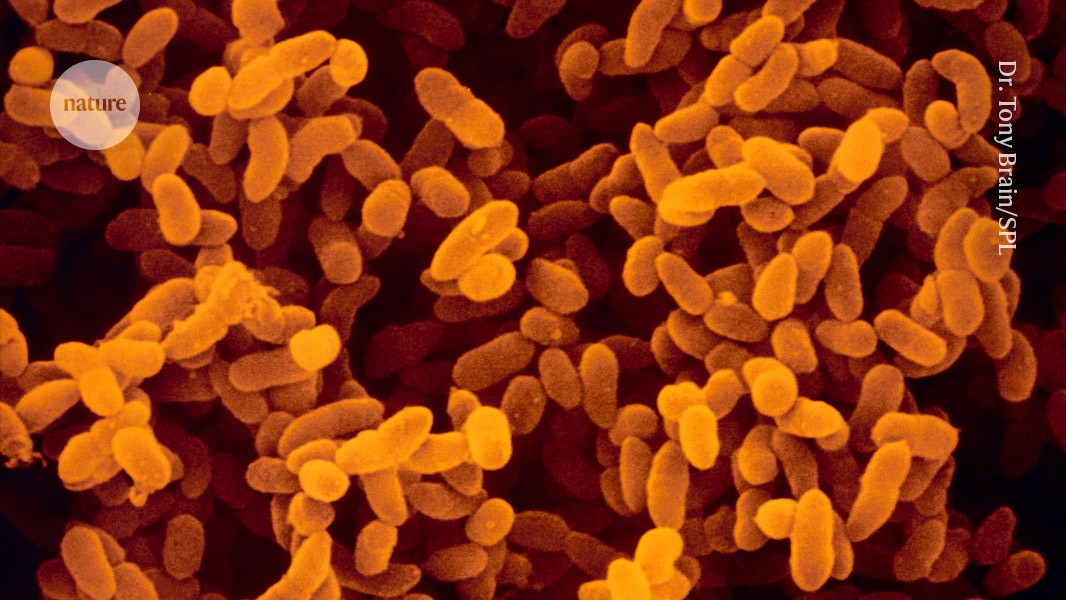‘Smart’ antibiotic can kill deadly bacteria while sparing the microbiome

Compound called lolamicin targets a group of harmful microbes but does not disturb those that live peacefully in the gut

Gram-negative bacteria such as Klebsiella pneumoniae (artificially coloured) are often resistant to multiple antibiotics, but they succumb to a new compound called lolamicin.Credit: Dr Tony Brain/Science Photo Library
They are the stuff of medical nightmares. Pathogens classified as Gram-negative bacteria are often hardy, virulent and quick to evolve resistance to antibiotics. Only a few drugs can knock them out, and these also destroy beneficial gut bacteria.
Now scientists have developed an antibiotic that kills pathogenic Gram-negative bacteria — even those resistant to many other drugs — without impairing the gut microbiome. So far, it has been studied only in mice, but if the compound works in humans, “it could help us dramatically”, says Sebastian Hiller, a structural biologist at the University of Basel in Switzerland who was not involved in the research. However, there is a caveat, he says: the compound’s usefulness “depends on whether bacteria will develop resistance to it in the long run”.
The study appears today in Nature.
Small but deadly
Gram-negative bacteria include public-health villains such as Escherichia coli and Klebsiella pneumoniae. They cause diseases ranging from salmonella to cholera, and can trigger sepsis, a potentially lethal immune-system response to infection.
The bacteria have “multiple barriers that prevent antibiotic penetration”, says molecular biologist Zemer Gitai at Princeton University in New Jersey, who was not involved in the research. As a result, there are almost no antibiotics that specifically target Gram-negative bacteria. The few drugs that do also wreak havoc with the gut microbiome, allowing potentially deadly pathogens such as Clostridioides difficile to take over.
To find a way around the bacteria’s defences, the study’s authors started with compounds that don’t kill the bacteria but are known to inhibit the ‘Lol system’, a group of proteins that is exclusive to Gram-negative bacteria. Tinkering with those compounds produced one that the researchers called lolamicin, which “selectively kills pathogenic bacteria over non-pathogenic bacteria based on differences in Lol proteins between these bacteria”, says study co-author Paul Hergenrother, a chemist at the University of Illinois at Urbana-Champaign.
Lolamicin had anti-microbial effects against more than 130 multidrug-resistant strains of bacteria growing in laboratory dishes. Mice that developed blood stream infections after exposure to antibiotic-resistant bacteria all survived after being given lolamicin, whereas 87% of those that didn’t receive the compound died within three days.
The team also found that common antibiotics such as amoxicillin severely disrupted the animals’ gut microbiome, which led to infections with C. difficile. By contrast, lolamicin treatment did not cause observable changes in the gut microbiome and spared mice from C. difficile infection.
‘A long road’
Gitai says that the study “proves the viability” of targeting the Lol system, but adds, “There is a long road from showing efficacy in mice to developing a drug for human use.”
Hiller also sounds a cautious note. The time from an antibiotic’s discovery to its approval for clinical use can be more than two decades, “and there is not much money to be made with a novel antibiotic”, he says. “Around ten to twenty new Gram-negative antibiotics have been discovered in the last ten years”, he adds, but none has gained approval from the US Food and Drug Administration.
doi: https://doi.org/10.1038/d41586-024-01566-8
This story originally appeared on: Nature - Author:Fred Schwaller


















